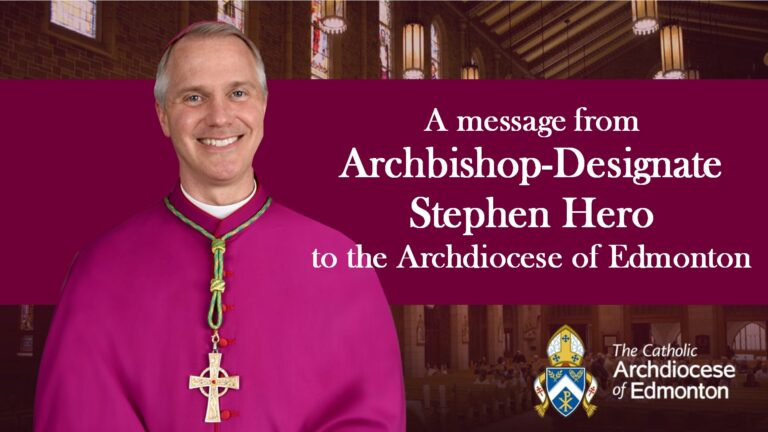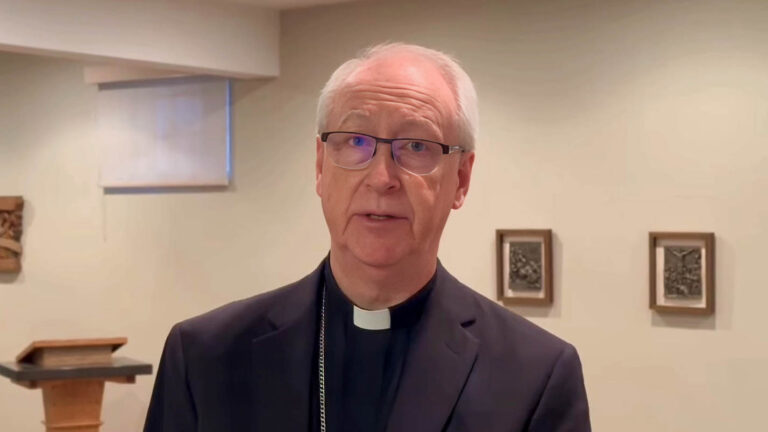The Easter Vigil in the Holy Night
Homily
We have just listened attentively to a wide range of scriptural texts central to our Christian faith. Beginning with Genesis, we then moved through Exodus and the prophets, until finally hearing the Gospel’s proclamation of the resurrection of Jesus from the dead. Now is the moment to ask: what does it all mean? What implications does this wondrous announcement of the love and power of God have for the way we live?
To answer those questions, allow me to take you back to the opening of this solemn liturgy. We began with what is called the lucernarium, the service of light. The sacred fire was lit, candles were set ablaze, darkness was dispelled, and the ancient hymn of praise called the Exsultet was proclaimed. The drama and imagery of the liturgy at that moment was such that it would have been easy to miss a curious, but very important reference made in the text of that hymn. I draw your attention to it in order to offer an answer to our questions: what does this all mean; what are the implications of the resurrection of Jesus for our lives?
The reference is to bees. As the hymn offers to God the Father the Easter candle with its flame, mention is made twice of these creatures whose work created the wax by which it was formed. This caught my attention a while back, and I have often wondered why referral to bees is made in the prayer. As you might have guessed, I am no bee expert, but I suggest that what we can all observe of their industry is instructive for us.
Bees move and work by instinct. It is as if each bee were “assigned” a particular task, and no other. Collectively, bees work with great diligence, and in a manner at once orderly and harmonious as they collectively produce that for which they were created. (Cf. Address of Pius XII to Beekeepers, Nov. 27, 1948.)
Implicit in this reference to bees and the way they work is an invitation to us, namely, to live and work by faith as bees do by instinct. Here is what I mean: faith in the Resurrection of Christ is the joyful acknowledgement that Jesus is Lord! This means the humble and hope-filled acceptance that his love and his Word must govern my life, that how I live must be determined and directed by none other than Jesus. It belongs to him, and to no one else, to assign to each person their duty as he calls us to follow him to eternal life and participate here on earth in his saving mission. He gives to each of us a unique task, and commands that we exercise it with unwavering fidelity, great energy, never in competition with others, and always in ordered harmony. Much like bees.
First among the responsibilities Jesus assigns is the duty to be baptized. He made that clear when he once told Nicodemus that the grace of Baptism is necessary to enter the kingdom of God (cf. John 3:5). Tonight, Saint Paul explains why this is so. The sacrament of Baptism so unites us to Jesus in his death and rising that his very own Risen life flows within us! Once we are baptized, he who is the Resurrection and the Life becomes himself the principle of our own lives. This vital union with the Risen Lord unites us with all the baptized and thus forms the Church. Together, we live under the Risen Lord’s sovereign rule, called to act in communion to do that for which we have been re-created, which is to give joyful witness to Jesus before the world. This task is so urgent that we must be far busier even than bees as we go about it.
Tonight, we are blessed to witness six persons respond to the call of the Lord and submit to Baptism. They are joined by three other people, already baptized, who have heard the Lord’s call to follow him as full members of the Roman Catholic Church. As we surround them with our prayerful support and welcome them as our newest brothers and sisters, we shall also recall our own Baptism by the solemn renewal of our baptismal promises. May this be a moment for us all to surrender anew to the Lordship of the Risen Christ, and seek the grace always to be faithful to the direction and the tasks he sets out for us.
Most Reverend Richard W. Smith
Saint Joseph Basilica
March 30th, 2024
…
To view photos from the Easter Vigil Mass, see below.
No media items found.


